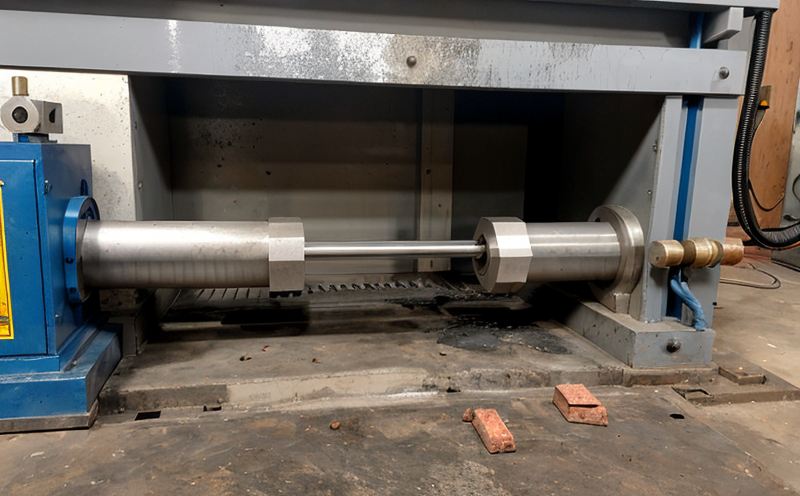ISO 12110 Thermo-Mechanical Fatigue Testing
The ISO 12110 standard provides a comprehensive framework for conducting thermo-mechanical fatigue (TMF) tests, which are essential to evaluate the resistance of materials and components under combined mechanical stress and temperature variations. This service is particularly crucial in industries where parts must withstand extreme conditions such as automotive, aerospace, and energy sectors.
The test assesses how a material or component behaves when subjected to cyclic loading at elevated temperatures. TMF testing helps identify the fatigue limit, which is the maximum stress that can be applied repeatedly without causing failure of the material or component over an infinite number of cycles. Understanding this limit ensures safer and more reliable designs in critical applications.
The process involves subjecting a specimen to alternating mechanical loads combined with thermal cycling within its operating temperature range. The test requires precise control of environmental variables, including temperature, humidity, and load amplitude, which can significantly influence the results. Specimen preparation is equally important; it must be representative of the actual component or part in use.
Our laboratory uses state-of-the-art equipment to ensure accurate testing according to ISO 12110 standards. Our experienced technicians follow strict procedures to prepare specimens and control environmental conditions, ensuring reliable data that can inform critical decisions about material selection and design optimization.
| Test Parameters | Description |
|---|---|
| Temperature Range | The temperature range should encompass the operating environment of the component or part under test. |
| Load Amplitude | The amplitude is controlled to simulate real-world stress conditions experienced by the material in its application. |
| Cycling Rate | The rate at which temperature cycles are applied, ensuring accurate simulation of operational environments. |
| Specimen Size and Geometry | Representative specimen size and geometry to ensure test results reflect the real-world performance of the component or part. |
The ISO 12110 TMF testing process involves several stages, each critical for obtaining accurate and reliable data. The initial phase includes careful selection and preparation of specimens that accurately represent the material in its actual application. Specimens are then subjected to controlled cyclic loading and temperature cycling.
During the test, our laboratory continuously monitors specimen performance, recording any signs of fatigue or failure. This monitoring ensures that we capture all relevant data points for analysis. Once the specified number of cycles is reached, specimens are thoroughly examined for cracks, fractures, or other forms of damage indicative of fatigue.
The results of ISO 12110 TMF testing provide valuable insights into a material's resistance to combined mechanical and thermal stress. These findings can guide improvements in material composition or design modifications to enhance performance and durability. The information derived from this testing is indispensable for industries where reliability under extreme conditions is paramount.
Scope and Methodology
- Specimen Preparation: Specimens must be representative of the actual component or part in use, with no defects that could influence test results.
- Cyclic Loading: The specimen is subjected to mechanical loading cycles at controlled temperatures within its operating range.
- Thermal Cycling: Specimens are cycled through temperature ranges relevant to their operational environment.
- Data Collection: Continuous monitoring of specimens during testing, recording any signs of fatigue or failure.
- Failure Analysis: Thorough examination of failed specimens to determine the cause of failure and assess material integrity.
The ISO 12110 TMF test is designed to mimic real-world conditions as closely as possible, ensuring that the results accurately reflect how materials will perform in their intended applications. Our laboratory adheres strictly to international standards to ensure consistent, reliable testing outcomes.
Benefits
- Informed Material Selection: Provides critical data for selecting materials that can withstand the required operational conditions.
- Improved Durability: Identifies weaknesses in design and material selection, allowing for iterative improvements.
- Risk Mitigation: Early detection of potential failures helps prevent costly downtime and safety hazards.
- Compliance Assurance: Ensures that materials meet the strictest international standards and regulatory requirements.
- Enhanced Product Quality: By identifying optimal material properties, TMF testing contributes to higher quality products.
- Cost-Effective Design: By avoiding costly redesigns due to early failures, TMF testing supports more efficient product development processes.
The ISO 12110 TMF test is a vital tool for ensuring the reliability and longevity of materials in critical applications. It provides essential data that can inform design decisions, enhance product quality, and reduce risks associated with material failure.
Quality and Reliability Assurance
The ISO 12110 TMF testing process is designed to provide accurate and reliable results that can be trusted for making informed decisions about materials and designs. Our laboratory employs rigorous quality control measures throughout the entire testing procedure, from specimen preparation to data analysis.
We use only high-quality equipment calibrated according to international standards to ensure precise measurements and consistent test conditions. Our technicians are highly trained and experienced in ISO 12110 TMF testing, ensuring that each test is conducted with utmost accuracy and consistency.
The results of our tests undergo thorough validation by independent experts to ensure their reliability and validity. This process ensures that the data generated from our ISO 12110 TMF tests can be trusted for making critical decisions about material selection and design optimization.





